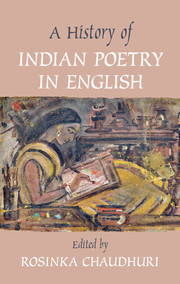Book contents
- Frontmatter
- Contents
- Contributors
- Acknowledgments
- Introduction
- SECTION I THE BROAD NINETEENTH CENTURY: INDIANS IN ENGLISH AND THE ENGLISH IN INDIA
- SECTION II PUBLISHERS, PUBLISHING HOUSES, AND THE PERIODICAL PRESS
- SECTION III POETRY: 1950–2000
- 13 Nissim Ezekiel: Poet of a Minor Literature
- 14 Dom Moraes: A Poet's Progress
- 15 Interpretative Testimony: Kamala Das and Eunice de Souza
- 16 Adil Jussawala and the Double Edge of Poetry
- 17 Arvind Krishna Mehrotra and the Interplay of Languages
- 18 Arun Kolatkar: A Singular Poetry in Two Languages
- 19 Imagery and Imagination in the Poetry of Jayanta Mahapatra
- 20 Modernisms and Modernity: Keki Daruwalla and Gieve Patel
- 21 The Third Generation: Melanie Silgardo and Manohar Shetty
- SECTION IV POETS OF THE DIASPORA
- SECTION V THE NEW MILLENNIUM POETS ON THEMSELVES
- Bibliography
- Index
19 - Imagery and Imagination in the Poetry of Jayanta Mahapatra
from SECTION III - POETRY: 1950–2000
Published online by Cambridge University Press: 05 March 2016
- Frontmatter
- Contents
- Contributors
- Acknowledgments
- Introduction
- SECTION I THE BROAD NINETEENTH CENTURY: INDIANS IN ENGLISH AND THE ENGLISH IN INDIA
- SECTION II PUBLISHERS, PUBLISHING HOUSES, AND THE PERIODICAL PRESS
- SECTION III POETRY: 1950–2000
- 13 Nissim Ezekiel: Poet of a Minor Literature
- 14 Dom Moraes: A Poet's Progress
- 15 Interpretative Testimony: Kamala Das and Eunice de Souza
- 16 Adil Jussawala and the Double Edge of Poetry
- 17 Arvind Krishna Mehrotra and the Interplay of Languages
- 18 Arun Kolatkar: A Singular Poetry in Two Languages
- 19 Imagery and Imagination in the Poetry of Jayanta Mahapatra
- 20 Modernisms and Modernity: Keki Daruwalla and Gieve Patel
- 21 The Third Generation: Melanie Silgardo and Manohar Shetty
- SECTION IV POETS OF THE DIASPORA
- SECTION V THE NEW MILLENNIUM POETS ON THEMSELVES
- Bibliography
- Index
Summary
I
Jayanta Mahapatra's poetic trajectory has been an unusual one. A college teacher of physics throughout his working life, he came to poetry late (as he was approaching forty), and in a state of isolation that was both cultural and geographic. He had, he says, read no modern poetry when he started out, and indeed little poetry at all beyond the “few poems of Keats, Shelley and Wordsworth that had been incorporated into our school literature texts.” He has been based for his entire career in his home town of Cuttack, Orissa, away from the major national and regional cultural centers of Indian life, although increasing publication abroad, particularly in the United States, brought with it opportunities for travel, residencies, and fellowships, including a stint at the International Writing Program in the University of Iowa. The late start has not prevented him from becoming the most prolific and perhaps most written-about of all the post-Independence Indian poets in English. Since his first book, Close the Sky, Ten by Ten, appeared in 1971, there has been a steady flow of poems (sixteen volumes in English), as well as short stories, essays, and translations from the Oriya. He also established and edited the well-regarded journal Chandrabhaga. The sheer energy, determination, and commitment required to carve a literary career out of his unpromising beginnings are remarkable.
Mahapatra has described his childhood as circumscribed and constricted. He was born into a lower-middle-class Christian family in 1928. His father, with whom he got on well, was a sub-inspector of primary schools, and was often away on work; his relationship with his mother, on the other hand, was strained and difficult – in part, Mahapatra seems to suggest, because of her rigidly dualistic morality: “Right and wrong, good and evil – she filed these thoughts, all acts, into two closed drawers of her life” (“JM,” 139). The world outside the house was also oppressive. Cuttack, then virtually a village, says Mahapatra, was a squalid, poverty-stricken environment:
This was Orissa then: the poverty of huts and hovels sunk into the red earth of squalid side lanes, and the bare needs of our people. The wild growth of vegetation around us, and the misery and disease.
- Type
- Chapter
- Information
- A History of Indian Poetry in English , pp. 299 - 312Publisher: Cambridge University PressPrint publication year: 2016



